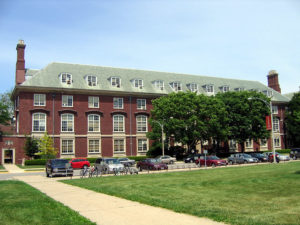College Budget Cuts Make Life Grueling for America’s Young and Unemployed
Students now piece together a degree at different schools the way the underemployed desperately piece together a paycheck with a string of shifts at different employers.Students now piece together a degree at different schools the way the underemployed desperately piece together a paycheck.
The vast quad of Los Angeles City College, rimmed by a jumble of architectural styles, boasts the ubiquitous footpaths and the patch of green found at so many American campuses. But come summer, the college that once burgeoned such culture makers as poet Charles Bukowski and filmmakers the Hughes brothers will largely lie fallow.
“We had to give our students notice in April that we didn’t have funds for summer classes,” said Dr. Jamillah Moore, president of the college. “But this is not a surprise. This is our fourth year facing some reduction because of the state deficit.” When Moore took the helm in 2008, the school had a $67 million annual budget, eroded now to $50 million even as a poor job market has increased demand for affordable education.
The California state college system endured budget cuts before the Great Recession, took a pounding during it and was on the ropes entering the 2009 recovery, losing a total of $1.6 billion in the past 10 years, the L.A. Times reports. Word this past May from Gov. Jerry Brown of a budget deficit hovering around $16 billion is the crushing body blow that’s readied the schools for a standing eight.
Although L.A. City College will provide summer courses in professional programs — dental, technology, radiologic technology and nursing — most students at LACC and at other Los Angeles community colleges are out of luck. “Since I arrived, we haven’t been more hard hit than Trade Tech, Pierce, Harbor — we’ve all been hit,” Moore explains, citing other schools in the nine campus Los Angeles Community College District. Moore says those affected can commute to another campus this summer; East Los Angeles College, for example, remains open. But students say that is not a viable option.
“I wanted to take my general courses in English and math this summer, but the students at East L.A. get first pick. By the time I could sign up, classes were closed out,” said Jessie Amado, 23, who was hawking brownies at a buck apiece to fund the LACC theater club. Had she gotten in to the alternative campus courses, her commute from Long Beach would have been two hours each way. With no class work and no job, she awaits an unpaid internship at Universal Studios or Capitol Records to salvage her summer. The theater major says that because of the cuts it will take her three years rather than two to earn enough credits to transfer to a four year college. And when she does, she will leave the state.
Amado’s classmate Cesar Azanza, 21, a lean and earnest actor who came to LACC for its well-regarded Theater Academy, added that budget cuts limited the department’s potential to provide instruction. “The class sizes are around 30 and that’s too many for drama,” he said. With students taking turns performing, Azanza explained, it’s impossible for everyone to get the necessary stage time within a two hour class. So it is broken up. “That means we have fewer exercises,” he said. “And though the teachers have done their best with critiques, I. …” He hesitates, and it comes out. He will be entering USC, a private university, as a sophomore after two and a half years at LACC, but “my first choice was to transfer to UCLA.” He blew the audition, and blames it on the overcrowding. “I could have been more prepared,” he said.
The grinding misery of the 21st century beats down on these students as relentlessly as the Southern California sun on the broken Hollywood pavement surrounding their LACC campus. Many here lost jobs and so enrolled in school. Now there’s no school.
These are parents and military veterans and new Americans with Russian, Tagalog, Armenian and Spanish as their first language, and in a county where 17.6 percent are living below the poverty line, many scramble for bus fare just to get to classes. The Los Angeles County I-TAP (Transit Access Pass) program, which allowed students to get to their desired campuses by paying only $20 per semester for public transportation, has also been canceled. And for many of these undergraduates, education is a dire matter of survival, the only way up from Wal-Mart job status; if they fail here there is no fallback position. And now they are resigned to the fact that what should be a two year path to a brighter future will be a struggle for them to complete in three.
“I’m trying to get a degree to get a better job, and it got a little crazy, taking care of my third grade son,” said Dena Leichnitz, 42, who worked part time to complete her course work and benefited from a district Board of Governors fee waiver and a book program. “But I would have graduated last year if classes weren’t canceled in winter 2011 and summer 2010.” And course cancellations aren’t the only effects of budget cuts, said the single mother active in student government. “Costs jumped from $26 to $36 per credit. Now they are talking going to $46 and you’re getting less and less for the money. For example, we had tutoring. The only reason I got through my math class — beginning algebra — was having a mentor, and I went from getting an F to a B. Now if you’re struggling in a class, perhaps you can meet with teachers at office hours. But they don’t have the mentors anymore.”Leichnitz may be a paradigm of the community college experience; she has transferred to UCLA to earn a political science degree and aims for law school. But her success is an exceptional example of commitment not demanded of the average student at other colleges.
The notion that it is acceptable to make students piece together a degree the way it’s become acceptable to make the underemployed desperately piece together a paycheck with a string of shifts at different employers hasn’t gone without a modicum of dissent.
In April, a small group of students rallied on the LACC quad and marched through classrooms to denounce their mistreatment, but failed to stir indifferent classmates. “Students that were in the classrooms did not really know what was going on,” Eun Ju Lee reported in the Los Angeles Collegian, a campus newspaper. The protesters were members of the Occupy LACC club, which was subsequently suspended, their action deemed by administrators to have disturbed classes. And other than a story buried in a forlorn pile of month-old newspapers, the only outward sign on this placid campus that lives are being disrupted is a collective sigh of “this sucks.”
Although Brown seemed determined to source money for education by shutting down state redevelopment agencies — citing widespread waste in the programs — that move faces a court challenge, leaving education funding reliant on a ballot initiative to temporarily raise taxes. Speaking to a reporter a day before commencement, Moore said “I don’t envy the governor or the Legislature for the choices they have to make. I’m hopeful the tax initiative will go forward [in] November.” And should voters balk at tax increases, LACC faces a forbidding future. “It is bleak,” she said. “We might have to make additional cuts, and that would be devastating.” But that scenario won’t be broached at the graduation ceremonies.
“Commencement is a time to celebrate the good work we’ve done,” Moore said. “And we will celebrate. Not talk about budget cuts.”
Your support is crucial…With an uncertain future and a new administration casting doubt on press freedoms, the danger is clear: The truth is at risk.
Now is the time to give. Your tax-deductible support allows us to dig deeper, delivering fearless investigative reporting and analysis that exposes what’s really happening — without compromise.
Stand with our courageous journalists. Donate today to protect a free press, uphold democracy and unearth untold stories.








You need to be a supporter to comment.
There are currently no responses to this article.
Be the first to respond.